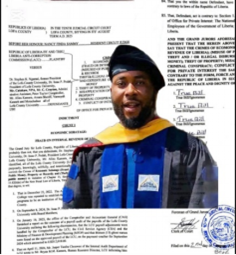The Liberia Anti-Corruption Commission (LACC)’s 2025 quarterly report has unearthed a significant corruption scandal at Lofa County University, sending shockwaves through the county and the nation. The report, which led to indictments by the Tenth Judicial Circuit Court, alleges widespread financial mismanagement involving over US$410,000 and more than 13.3 million Liberian Dollars (LRD). Several high-ranking university officials, including the current and former presidents, vice president, administrative assistant, finance officer, and board co-chair, are implicated in the scheme. The charges range from theft of property and economic sabotage to misuse of public funds, criminal conspiracy, abuse of office, and violations of Liberia’s penal law, public financial management law, and the Code of Conduct for Public Officials. The unfolding scandal has sparked public outrage and calls for immediate action, with citizens and student groups demanding the suspension of all indicted officials pending the outcome of the investigation.
The LACC’s investigation has revealed a series of dubious transactions that point to a concerted effort to defraud the university. Among the questionable expenditures highlighted are 103,985 LRD for fuel lacking supporting documentation, over 232,560 LRD and 32,500 LRD spent without proper accountability, and a particularly egregious case involving USD 3,350 approved for a retreat that never materialized. A check for the retreat was issued to Board Co-Chair Annie M. Flomo, with no record of a refund or any evidence that the event took place. These findings suggest a systemic failure of financial oversight and a blatant disregard for public trust within the university’s administration.
The citizens of Lofa County, particularly the student body preparing for a new semester, have expressed their indignation at the alleged corruption. Lofa Youth for Accountability and Good Governance, a prominent local group, has been vocal in its demand for the immediate suspension of all indicted officials. They argue that precedent set in previous cases involving LACC indictments should apply equally to the university officials, emphasizing the need for consistent application of the law. Student organizations on campus, including the influential Student Unification Party (SUP) and Student Integration Movement (SIM), have echoed these calls, adding their voices to the growing chorus demanding accountability and threatening potential unrest if their demands are ignored.
The scandal has not only tarnished the reputation of Lofa County University but also raised serious concerns about the integrity of Liberia’s educational and governance systems. The university, considered a premier institution in the county, is now facing a crisis of confidence, with its academic and moral foundation shaken. The unfolding events have underscored the urgent need for comprehensive reforms to strengthen financial oversight and promote ethical conduct within public institutions. The case has also attracted the attention of national anti-corruption watchdogs, civil society groups, and international partners, who are closely monitoring the situation and advocating for transparency and accountability in the legal proceedings.
As the case proceeds, the Tenth Judicial Circuit Court will play a crucial role in ensuring a fair and impartial trial. Pre-trial hearings are expected to commence in the coming weeks, with the LACC presenting its findings and evidence against the accused. If convicted, the individuals involved could face severe penalties, including hefty fines, dismissal from public service, recovery of stolen assets, and potential imprisonment. The outcome of this case will have significant implications for the fight against corruption in Liberia and will send a powerful message about the consequences of abusing public trust.
The Lofa County University corruption scandal serves as a stark reminder of the ongoing challenges Liberia faces in its efforts to combat corruption and strengthen governance. The case highlights the vulnerability of public institutions to financial mismanagement and the importance of robust oversight mechanisms. It also underscores the critical role of citizens, civil society organizations, and international partners in holding public officials accountable and demanding transparency. The unfolding events in Lofa County will undoubtedly have a lasting impact on the nation’s educational landscape and will shape future efforts to promote ethical leadership and good governance in Liberia. The hope is that this scandal will serve as a catalyst for meaningful reforms and a renewed commitment to combating corruption at all levels of society.


